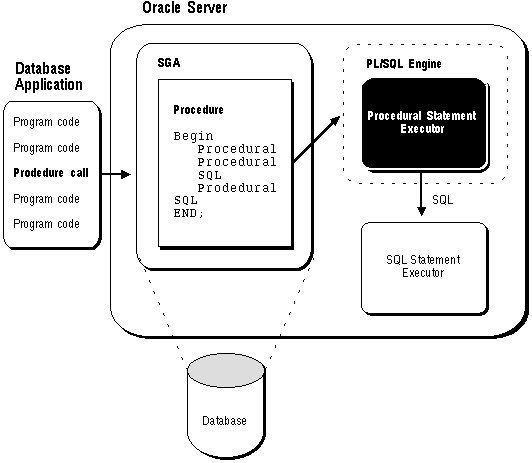










An anonymous block is a PL/SQL block that appears within your application and it is not named or stored in the database. In many applications, PL/SQL blocks can appear wherever SQL statements can appear.
A stored procedure is a PL/SQL block that Oracle stores in the database and can be called by name from an application. When you create a stored procedure, Oracle parses the procedure and stores its parsed representation in the database. Oracle also allows you to create and store functions, which are similar to procedures, and packages, which are groups of procedures and functions. For information on stored procedures, functions, packages, and database triggers, see Chapter 14, "Procedures and Packages", and Chapter 15, "Database Triggers".

Figure 11 - 1. The PL/SQL Engine and the Oracle Server
The procedure (or package) is stored in a database. When an application calls a procedure stored in the database, Oracle loads the compiled procedure (or package) into the shared pool in the System Global Area (SGA), and the PL/SQL and SQL statement executors work together to process the statements within the procedure.
The following Oracle products contain a PL/SQL engine:
Also, you can pass anonymous blocks to Oracle from applications developed with these tools:
Variables and Constants Variables and constants can be declared within a procedure, function, or package. A variable or constant can be used in a SQL or PL/SQL statement to capture or provide a value when one is needed.
Note: Some interactive tools, such as Server Manager, allow you to define variables in your current session. Variables so declared can be used similarly to variables declared within procedures or packages.
Cursors Cursors can be declared explicitly within a procedure, function, or package to facilitate record-oriented processing of Oracle data. Cursors also can be declared implicitly (to support other data manipulation actions) by the PL/SQL engine.
Exceptions PL/SQL allows you to explicitly handle internal and user-defined error conditions, called exceptions, that arise during processing of PL/SQL code. Internal exceptions are caused by illegal operations, such as divide-by-zero, or Oracle errors returned to the PL/SQL code. User-defined exceptions are explicitly defined and signaled within the PL/SQL block to control processing of errors specific to the application (for example, debiting an account and leaving a negative balance).
When an exception is raised (signaled), the normal execution of the PL/SQL code stops, and a routine called an exception handler is invoked. Specific exception handlers can be written to handle any internal or user-defined exception.
While many Oracle products have PL/SQL components, this chapter specifically covers the procedures and packages that can be stored in an Oracle database and processed using the PL/SQL engine of Oracle Server. The PL/SQL capabilities of each Oracle tool are described in the appropriate tool user guide.
Oracle also allows you to create and call stored procedures. If your application calls a stored procedure, the parsed representation of the procedure is retrieved from the database and processed by the PL/SQL engine in Oracle. You can call stored procedures from applications developed using these tools:
This permits you to create procedures that are more general purpose. For example, using dynamic SQL allows you to create a procedure that operates on a table whose name is not known until runtime.
Additionally, you can parse any data manipulation language (DML) or data definition language (DDL) statement using the DBMS_SQL package. This helps solve the problem of not being able to parse data definition language statements directly using PL/SQL. For example, you might now choose to issue a DROP TABLE statement from within a stored procedure by using the PARSE procedure supplied with the DBMS_SQL package.




